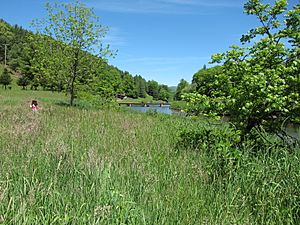Todd, North Carolina facts for kids
Quick facts for kids
Todd
|
|
|---|---|

The south fork of the New River in Todd, NC
|
|
| Country | United States |
| State | North Carolina |
| Counties | Wautauga, Ashe |
| Elevation | 2,992 ft (912 m) |
| Population
(2010)
|
|
| • Total | 2,141 |
Todd is a small place in northwestern North Carolina, United States. It's called an unincorporated community, which means it doesn't have its own local government like a town or city. Todd is special because it sits right on the border between two counties: Watauga and Ashe.
This community is located along the South Fork of the New River. It's quite high up, at an elevation of 2,992 feet (about 912 meters) above sea level. In 2010, about 2,141 people lived in Todd. The local ZIP Code for Todd is 28684.
Contents
History of Todd
Todd has a long and interesting history, starting as a small settlement and growing into a busy community before facing challenges.
Early Days as Elk Cross Roads
Todd was first settled in the late 1700s and early 1800s. Back then, it was known as Elk Cross Roads. It was a quiet, rural area in the Blue Ridge Mountains, mostly home to farmers.
The community started to grow with important buildings. The first church, South Fork Baptist Church, opened in 1833. A Post Office was set up in 1837, making it easier for people to send and receive mail. Another church, Blackburn's Chapel, was founded in 1850. By the 1850s, Elk Cross Roads was big enough to be shown on maps of North Carolina. It even had several stores where people could buy goods.
Growth and a New Name
In the late 1800s, Todd became much busier. People started harvesting a lot of timber (wood) from the forests. They also began mining for materials like mica and copper. By the 1890s, Todd was actually larger than the nearby town of Boone!
In 1894, the Post Office officially changed the community's name to Todd. This was done to honor Joseph Warren Todd. He was a local hero and a veteran of the Civil War. After the war, he helped bring peace and order to the area. His brother, James, had been sadly killed nearby. Joseph Warren Todd worked as a lawyer and served in the North Carolina General Assembly, which is like the state's parliament.
The Timber Boom and the "Virginia Creeper"
The early 1900s were Todd's busiest time, thanks to the timber industry. In 1910, a railroad company called the Virginia–Carolina Railway decided to extend its tracks to Elk Cross Roads (now Todd). This train was nicknamed the "Virginia Creeper" because it moved slowly but steadily up the steep mountain slopes.
At its peak, Todd was a thriving place. It had two doctors, a dentist, a bank, seven stores, three mills, and two hotels. In 1915, Todd even became an official town with its own mayor, council, and town marshal. Walter Cook, who ran a general store for over 40 years, was the only person ever elected as mayor.
Challenges and Decline
The railroad came to Todd mainly because of all the timber. But by 1934, most of the valuable timber had been cut down. Also, the Great Depression, a very difficult economic time, forced the railroads to stop service to Todd.
The Bank of Todd closed, and most of the town's businesses disappeared within a few years. In 1940, a terrible flood destroyed many buildings, making Todd's decline even worse. By World War II, only a few businesses were left. The North Carolina General Assembly officially removed Todd's town status in the 1970s.
Todd Today
For many years in the mid-to-late 1900s, Todd was just a quiet crossroads with a post office and a store, home to hardworking farming families. However, in the 21st century, Todd has started to become popular again. People are visiting for cultural tourism, and many are buying second homes there.
Several important historical buildings in Todd are recognized nationally. These include the Elkland School Gymnasium, the R. T. Greer and Company Root and Herb Warehouse, and the Todd Historic District. These places are listed on the National Register of Historic Places, which helps protect them for the future.
Images for kids
 | John T. Biggers |
 | Thomas Blackshear |
 | Mark Bradford |
 | Beverly Buchanan |


